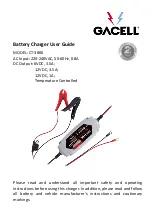
X-Series
13 of 20
User’s Manual
2. Connect the charger DC output connector to the battery pack connector by firmly grasping both connectors
and plugging them straight together. The charger will start automatically, which is indicated by the blinking
Charge Status LED on the user interface (on for approximately 1 second followed by off for approximately 1
second). If the charger does not automatically start because the battery is overly discharged, the Low
Voltage Start button on the user interface can be used to manually start a charge cycle. See Section 9.2 for
details.
3. If the charger must be disconnected from a battery pack while a charge cycle is in progress, press the
Stop/Start button on the user interface to stop the charge cycle before disconnecting the DC output connector
from the battery pack. Do not disconnect the DC output connector from a battery pack while a charge cycle is
in progress. The resulting arcing and burning of the connectors could cause the battery to explode.
4. Monitor the ammeter on the charger user interface for the correct charge current. The initial charge current
could vary several amps from the start current listed in the specifications, depending on both the condition of
the battery pack and its depth of discharge.
5. The charger automatically terminates the charge cycle when the battery pack reaches full charge. The
necessary charge time is affected by numerous factors. The major factors affecting the required charge time
are the amp-hour capacity, depth of discharge, temperature, and age/usage of the battery pack. Completion
of the charge cycle is indicated by [1] the solid illumination of the Charge Status LED on the user interface or
[2], if the charger is configured for a post-charge mode, the Charge Status LED displaying a repeating pattern
of long on (approximately 4 seconds) followed by short off (approximately 1 second).
6. If the charger is in a post-charge mode, press the Stop/Start button on the charger user interface to terminate
the post-charge mode, which is indicated by the solid illumination of the Charge Status LED.
7. Disconnect the charger DC output connector from the battery pack connector by grasping both connectors
and pulling them straight apart.
8. If the charger DC output connector remains connected to the battery pack connector after the charger
automatically terminates the charge cycle and the charger has AC power available, it will enter a storage
mode where it periodically performs a maintenance charge cycle. (Storage mode is a feature of specific
charge/battery profiles. Contact your dealer to determine if your charger includes a storage mode.)
On-Board Charger Operation:
1. With the charger AC input plug disconnected from the AC outlet/receptacle, connect the DC output connector
to the battery pack (if not already connected).
2. Connect the charger AC input plug to a single-phase, 120V, 60 Hz AC outlet. The charger will start
automatically, which is indicated by the blinking Charge Status LED on the user interface (on for
approximately 1 second followed by off for approximately 1 second). If the charger does not automatically
start because the battery pack is overly discharged, the Low Voltage Start button on the user interface can be
used to manually start a charge cycle. See Section 10.2 for details.
3. If the charge cycle must be terminated early, press the Stop/Start button on the charger user interface.
4. Monitor the ammeter on the charger user interface for the correct charge current. The initial charge current
could vary several amps from the start current listed in the specifications, depending on both the condition of
the battery pack and its depth of discharge.
5. The charger automatically terminates the charge cycle when the battery pack reaches full charge. The
necessary charge time is affected by numerous factors. The major factors affecting the required charge time
are the amp-hour capacity, depth of discharge, temperature, and age/usage of the battery pack. Completion
of the charge cycle is indicated by [1] the solid illumination of the Charge Status LED on the user interface or
[2], if the charger is configured for a post-charge mode, the Charge Status LED displaying a repeating pattern
of long on (approximately 4 seconds) followed by short off (approximately 1 second).






































